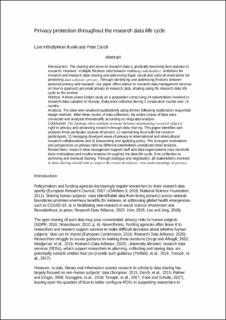Privacy protection throughout the research data life cycle
Peer reviewed, Journal article
Published version
Permanent lenke
https://hdl.handle.net/11250/3034457Utgivelsesdato
2022Metadata
Vis full innførselSamlinger
Sammendrag
Introduction. The sharing and reuse of research data is gradually becoming best practice in research. However, multiple frictions exist between realising stakeholders’ ambitions for research and research data sharing and addressing legal, social and cultural imperatives for protecting data subjects’ privacy. Through identifying and addressing frictions between personal privacy and research, our paper offers advice to research data management services on how to approach personal privacy in research data, sharing using the research data life cycle as the context.
Method. A three-phase Delphi study on a population comprising twenty-four stakeholders involved in research data curation in Norway. Data were collected during three consecutive rounds over fourteen months.
Analysis. The data were analysed qualitatively using themes following exploratory sequential design methods. After three rounds of data collection, the entire corpus of data were connected and analysed thematically according to integrated analysis.
Results. The findings show multiple tensions between maintaining research subjects’ right to privacy and advancing research through data sharing. This paper identifies and analyses three particular sources of tension: 1) maintaining trust with the research participants, 2) managing divergent views of privacy in international and intercultural research collaborations and 3) interpreting and applying policy. The divergent motivations and perspectives on privacy held by different stakeholders complicate these tensions.
Conclusions. Researchers, research data management support staff and data organizations must reconcile these motivations and resolve tensions throughout the data life cycle, from collection to archiving and eventual sharing. Through dialogue and negotiation, all stakeholders involved in data sharing should aim to respect the research subjects’ own understandings of privacy.

